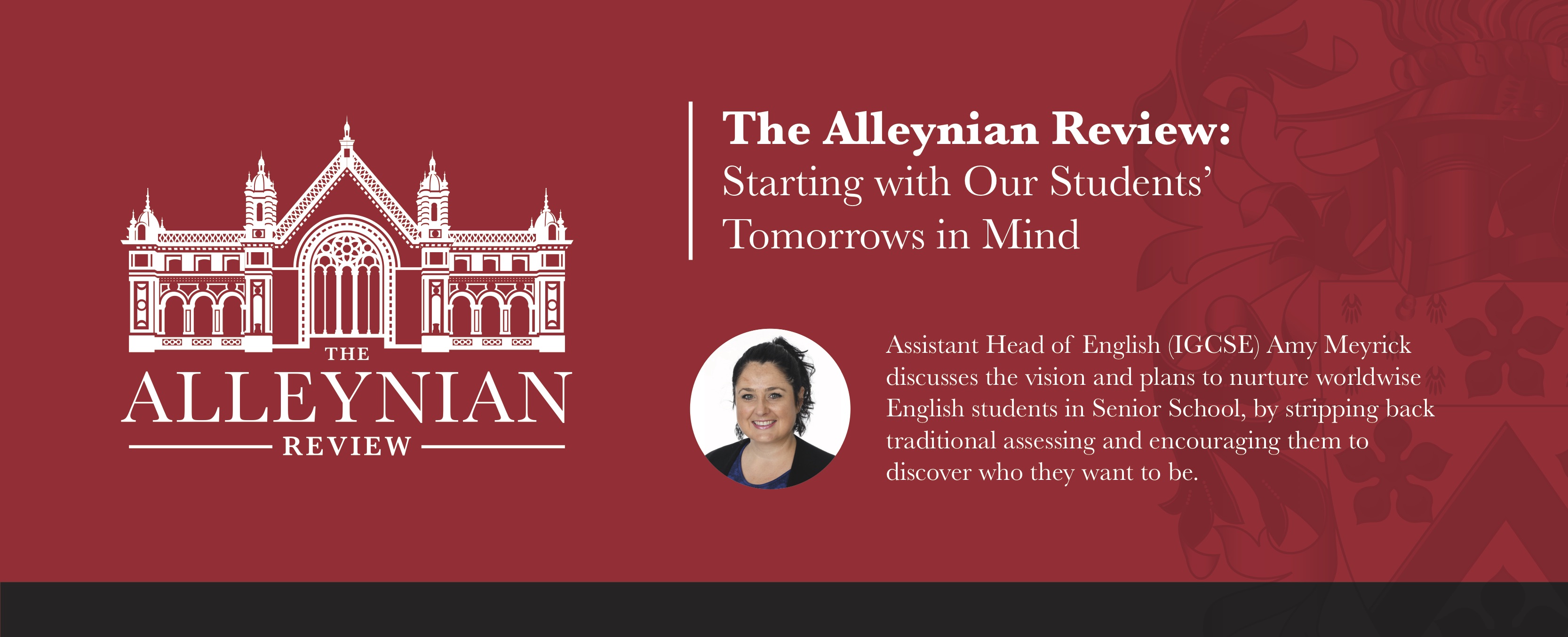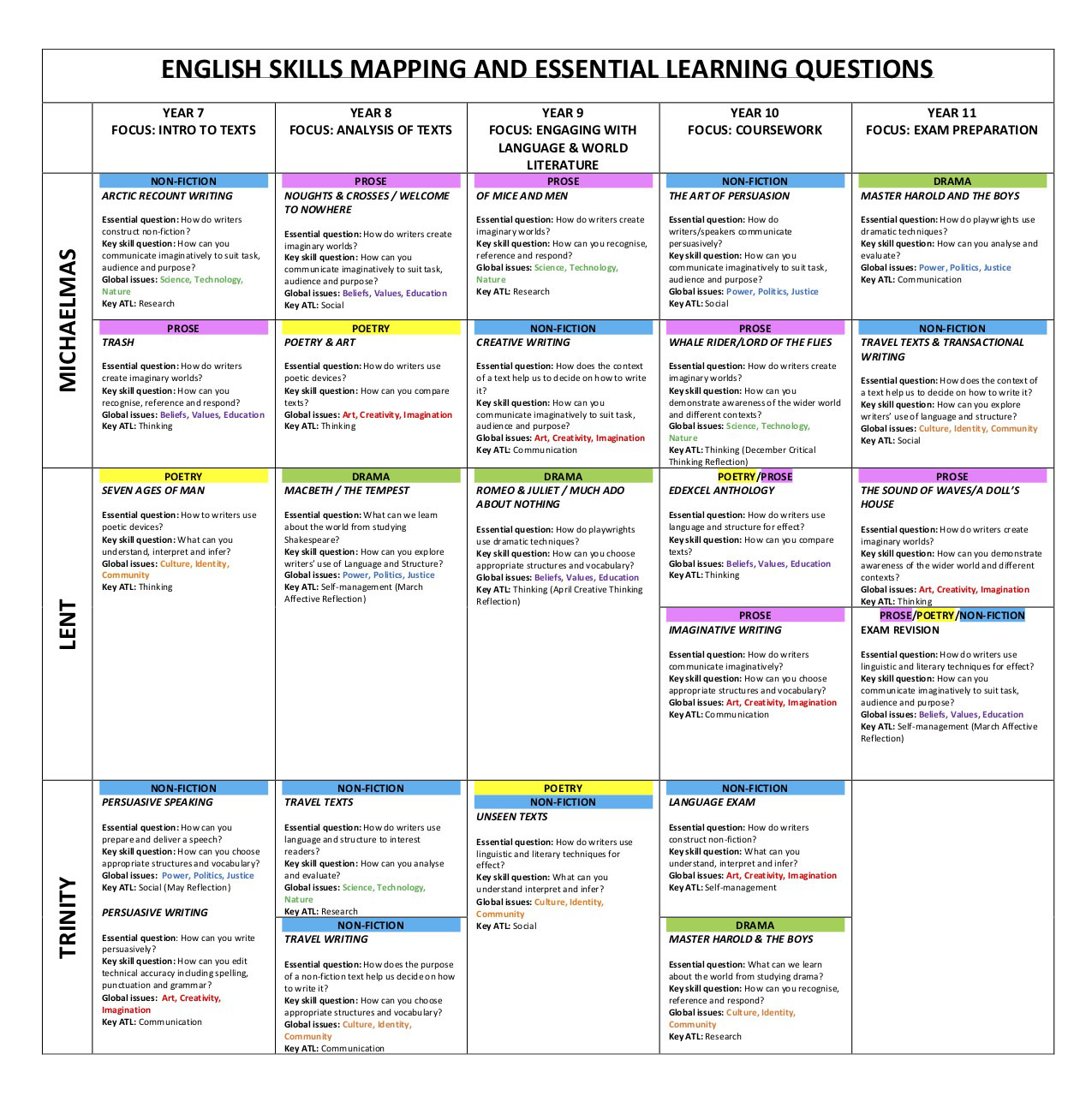The Alleynian Review: Starting with Our Students' Tomorrows in Mind
Assistant Head of English (IGCSE) Amy Meyrick discusses the vision and plans to nurture worldwise English students in Senior School, by stripping back traditional assessing and encouraging them to discover who they want to be.

‘Tomorrow belongs to those who prepare for it today’ – Malcolm X.
Our students tomorrows will be multi-lingual, multi-media, multi-modal, multi-purpose and multi-skilled. English, as a core subject, is indispensable in preparing our learners beyond the traditional skills of listening, speaking, reading and writing. We want our students to excel at languages and literature in the real world; we want them to be masters of world Englishes and world literature. But what does this mastery look like? What do we want them to be able to do? How do we want them to think? How do we want them to feel? And, after they graduate, what memories will they have? More practically, how have we embedded this experience in our Senior School English curriculum at Dulwich College (Singapore) and how are we mapping their journey so our English students are confidently equipped for their tomorrows?
Discussions of change, especially in terms of assessment, have been at the forefront of our Senior School agenda. Students are now regularly reflecting on the International Baccalaureate’s five approaches to learning; thinking skills; communication; social skills; research and self-management. Skills are prioritised over content, encouraging concepts such as transfer, metacognition, collaboration and critical thinking. This coincides with our commitment to formative assessment – ongoing dialogue throughout students’ learning journeys – as well as a renouncement of national curriculum levels, previously used to assess students before their IGCSE years.
So, in mapping our students' journeys towards mastery in English, where do we start? British educationalist, Dylan Wiliam, recommends starting “with the end in mind” and mapping backwards from Year 13, considering where individuals are when they join us in Year 7, then deciding on the route which needs to be taken. Fortunately for us, our colleagues in the Junior School furnish students with key literary and linguistic skills, providing regular, quality feedback and reflection time; students are already used to meticulousness at word and sentence level, as well as wider, more holistic thinking about literature and the English language.
Our decision to minimise summative feedback and the reporting of grades with our younger students removes the notion of labelling students as a number, letter or percentage. Instead, we are accentuating the value of dialogue; regular interaction; specific, real-time feedback; and day-to-day constructive advice. Nevertheless, their journey towards mastery won’t be a linear route; it entails daily endeavours, often treks and turbulence and sometimes backwards steps to choose a trustier course. Their journey needs guidance, conversation and re-direction; it doesn’t necessarily have a finish line nor the need for finite results. It’s personal, not competitive.
Constructing our nine skills in English allows us to draw from the best. We evaluated concepts and criteria from the IB Diploma Programme; IGCSE English language and world literature specifications and assessment objectives; foci from the English national curriculum; as well as a range of literature on formative assessment and skill-based learning, particularly from Dylan Wiliam and Daisy Christodoulou. After a year of consultations and drafts, our current outline looks like this:

Ultimately, we want our students to understand and interpret more than texts. We want them to be readers of people, situations and subtle nuances. We want our students to analyse and evaluate more than just technical features. We want them to analyse options and evaluate their choices. We want our students to write more than essays. We want them to communicate confidently and appropriately, regardless of the context, adding their own conviction, voice and flair. Optimistically, we want their ideas, personalities and sense of humanity to change the world.
Language and texts surround us in society, so every student is innately an ‘expert’ at language, even if English isn’t their mother tongue. This puts us, as a department, at an immediate advantage; humankind is a species of readers, listeners, interpreters. Between the ages of 11 and 18, we want to guide our students so, by the time they graduate, they are ‘worldwise’; they are adept at using and interpreting language and engaging empathically with literature. International mindedness takes precedence when making decisions about texts. British favourites Duffy, Golding and, of course, Shakespeare are popular selections, alongside our North American friends Steinbeck, Angelou and Atwood. However, we want our young people to meet a wider variety of world Englishes, together with the best of translated literature.
In our department, students, in every year group, encounter renowned international writers from Nigeria’s Adiche and Iran’s Satrapi to New Zealand’s Ihimaera and South Africa’s Fugard. Texts are set in Syria, France, Norway and the Philippines; aware of global issues and engaging with different countries and cultures, our students read outside of their own contexts and experiences.
Throughout the Senior School, our units are embedded with a focus on the IB’s global issues - specifically art, creativity and imagination; beliefs, values and education; science, technology and the environment; culture, identity and community; and power, politics and justice. These are coupled with essential questions, encouraging critical, even philosophical, thinking, such as ‘How do writers create imaginary worlds?’ and ‘How does the context of a text help us decide on how to write it?’ Again, keeping our foci free from context, students are inspired to broaden their thinking, transferring ideas and skills across the curriculum. Our ‘map’ taking English students from Years 7 to 11 can be found here:

Our relationship with our students goes beyond the academic and beyond the individuals in our classes. We endeavour to take collective responsibility for students of English, to offer them opportunities and interactions outside of curriculum time, to support them pastorally, nurturing their holistic wellbeing and not only training their brains. Considering how they speak to each other and which relationships are worth building, we want our students to ask questions, learn from others’ answers and offer their opinions and thoughts. We want them to justify choices and converse with those who think, look and sound different from them. We want to surprise their expectations and challenge preconceptions.
In our English department, we hope our students’ experiences are held close to their hearts. We hope they’ll encounter a range of emotions through the study of literature and how language works – passion, anger, regret, sadness, grief, compassion and joy. We hope they’ll make memories and remember not just what we taught them or what they can do, but how they felt.
Starting with their tomorrows in mind, our young people will be masters of words, language and texts. They’ll be empathetic, creative, knowledgeable people. Their inner ‘shelves’ will hold more than books. Our students will be worldwise.
Thank you to Amy Meyrick, Assistant Head of English (IGCSE), for contributing this thought-provoking piece to The Alleynian Review.





